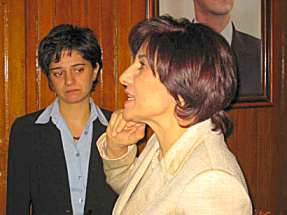Bouthaina Shaaban,
Director of Foreign Media, Syrian Foreign Ministry
18-sep-03, 1:10 pm
On the way to meet with
Bouthaina Shaaban, Director of Foreign Media,
Bashar tells us that she was Hafez Assad's personal interpreter.
Also, there is a rumor that she will be the Foreign Minister after
the government reorganization that is taking place this very day.
She is also author of "Both Right and Left Handed", a book about Arab women.
 Ms. Shaaban is very articulate and speaks excellent English.
She went to college in the U.S. (Cornell or Columbia, I forget which).
She has been to America twice this year (2003).
Her assistant is also U.S.-educated.
This meeting is one of our best; she is frank, forthright, and we have
a real back-and-forth discussion for a change.
(By the end of the day she will be elevated to a ministry,
but she'll be Minister of Syrians Living Abroad rather than the
Foreign Minister. However, it's a high-visibility position; recent Googling
turns up a lot of her recent quotes in the international press.)
We are served tea.
Ms. Shaaban is very articulate and speaks excellent English.
She went to college in the U.S. (Cornell or Columbia, I forget which).
She has been to America twice this year (2003).
Her assistant is also U.S.-educated.
This meeting is one of our best; she is frank, forthright, and we have
a real back-and-forth discussion for a change.
(By the end of the day she will be elevated to a ministry,
but she'll be Minister of Syrians Living Abroad rather than the
Foreign Minister. However, it's a high-visibility position; recent Googling
turns up a lot of her recent quotes in the international press.)
We are served tea.
Shaaban cites religious pluralism: "Syria is not a tolerant
country, it is a country of mutual enjoyment."
Also, "it is impolite to ask a Syrian what is his religion."
She cites some myths about the U.S. that are widely believed here:
that the U.S. wants everyone to be a copy of themselves, that the U.S.
media is controlled by the Israelis, that Americans believe that
Syrian women are oppressed.
Of course we discussed Palestine.
At the 2002 Beirut conference, Arabs agreed
that a just resolution would
guarantee Israel's security
in return for withdrawal to the Green Line. Sharon refused this.
The Madrid proposal is the closest we've come to a settlement, but
Barak wouldn't close the deal.
Arabs were particularly upset when Bush called Sharon "a man of peace."
She also cites the targeted assassinations; a friend of hers, who she
believes was never involved in terrorism, was one of the targets.
She points out that Western legal systems
forbid prosecution based on suspicion
of intent rather than on action,
and that these assassinations violate that principle.
She does say that Syrians believe that Arafat is corrupt and is
prolonging the violence for his own ends.
Syria feels left out of the peace process.
They feel that Syria is a key player and cannot be ignored, and that
America has been acting unilaterally and in ignorance.
The U.S. can no longer claim to be a fair arbiter. A new administration
might be able to reclaim this image.
Arabs, she says, have generally viewed America favorably.
America, after all, has never been a colonial power here.
She professes a particular admiration for Jimmy Carter and for
Anwar Sadat.
She discusses the problems of women, which sound very familiar to us:
particularly the glass ceiling.
She does note that Syria subsidizes daycare and that
any business with more than 50 employees is required to provide it.
Women in Syria feel safe -- the crime rate is very low.
But there should be more women in decision-making positions.
The parliament is 10% female.
She feels that a major factor that holds women back is their own
lack of self-confidence.
We touch on Iraq. "You could have had the oil and our love."
The Iraqi government actually opposed the lifting of sanctions by Arab states.
Lifting the sanctions would
have given the Iraqi people more power to overthrow Saddam.
She feels sorrow for the Iraqis, a very educated and westernized people.
She recounts the saying (that I've heard elsewhere) that "Cairo writes,
Beirut publishes, and Baghdad reads".
Shaaban, like many others,
cites the title "Clash of Civilizations", hoping instead for
a "Dialogue of Civilizations".
The Arab world has become much more polarized after 9/11; many of
Shaaban's friends deride her moderation, calling it naive.
To mend it's image, all
that America needs to do is to treat the Arab world with respect and
fairness.
I ask a long and deliberately leading question:
The Arab nations are so focused on the
Palestinian issue that they aren't addressing their own internal problems.
Some leaders even seem to be using the Palestinian issue to divert
attention from their own shortcomings.
What would be the prime problems, the "next steps", in the Arab world
if the Palestinian issue were "magically" resolved?
Ms. Shaaban nods in agreement with the question, then thinks for
a moment, and says "unemployment and the economy,
followed by democratic reform".
|